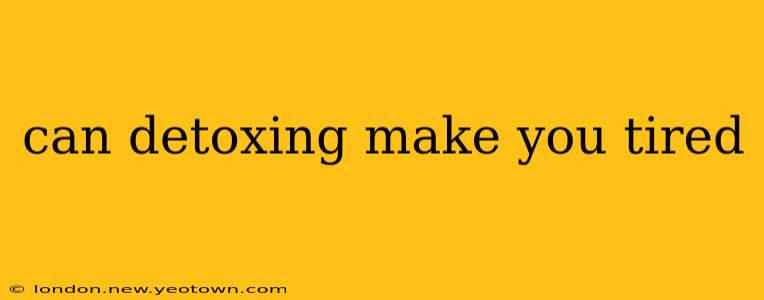Can Detoxing Make You Tired? The Unexpected Fatigue of Cleansing
The idea of a detox—a cleanse to rid your body of toxins—is alluring. We're bombarded with images of vibrant health and promised energy boosts, but the reality can be… surprisingly tiring. So, can detoxing make you tired? The answer is a resounding yes, and for a variety of reasons, some expected, some less so. Let's delve into the science and experience behind this often-overlooked side effect.
Why Does Detoxing Leave You Feeling Drained?
Imagine your body as a finely tuned machine. When you embark on a detox, even a seemingly gentle one, you're essentially changing the fuel source and operational parameters. This shift can trigger several fatigue-inducing factors:
-
Nutrient Deficiencies: Many detox diets severely restrict caloric intake or eliminate entire food groups. This can lead to deficiencies in essential vitamins and minerals, which are crucial for energy production. Think of it like trying to run a car on empty – it's simply not going to work efficiently.
-
Dehydration: Some detoxes promote excessive water intake, flushing out electrolytes. Electrolytes like sodium and potassium are essential for nerve and muscle function, including energy production. Losing them can lead to fatigue, muscle cramps, and dizziness.
-
Blood Sugar Imbalances: Restricting carbohydrates can cause blood sugar levels to plummet, leading to fatigue, headaches, and irritability. Your body relies on a consistent supply of glucose for energy, and depriving it can leave you feeling sluggish.
-
Withdrawal Symptoms: If you're detoxing from caffeine, alcohol, or nicotine, withdrawal symptoms like headaches, fatigue, and mood changes are common. These are your body's way of adapting to the absence of these substances.
-
The Stress Response: The body interprets restrictive diets as a stressor. Chronic stress can significantly impact energy levels, sleep quality, and overall well-being. Ironically, the detox meant to improve your health can create a stress response that leaves you feeling worse.
What Types of Detox Diets Are Most Likely to Cause Fatigue?
While all detoxes can potentially cause fatigue, some are more likely culprits than others. Those that drastically restrict calories, cut out essential nutrients, or promote excessive fasting are likely to leave you feeling depleted. Juice cleanses, for example, often lack sufficient protein and healthy fats, contributing to fatigue.
How Long Does Detox Fatigue Typically Last?
The duration of detox fatigue varies depending on the type and intensity of the detox, as well as individual factors like metabolism and overall health. It can range from a few days to several weeks. However, if fatigue persists beyond a few weeks, it's crucial to consult a healthcare professional to rule out underlying health issues.
Is Detox Fatigue a Sign That the Detox is Working?
This is a common misconception. Detox fatigue is not an indication that the detox is effectively removing toxins. Your liver and kidneys are already equipped to handle detoxification naturally. Fatigue is more likely a sign of nutritional deficiencies, electrolyte imbalances, or the body's response to stress caused by the restrictive diet.
What Can I Do to Mitigate Detox Fatigue?
If you're determined to undertake a detox, prioritize gradual changes and focus on nutrient-dense foods. Stay well-hydrated, and consider consulting a registered dietitian or healthcare professional to ensure you're meeting your nutritional needs. Prioritize rest and gentle exercise to support your body's natural detoxification processes.
In conclusion, while the allure of detoxing is strong, it's crucial to acknowledge the potential for significant fatigue. Understanding the underlying causes and mitigating strategies is key to navigating this common side effect. Remember, sustainable lifestyle changes focusing on whole foods, adequate hydration, and stress management are far more effective and gentler ways to promote long-term health and well-being than crash diets and restrictive detox programs.

